JAW disorder (Pain, Clicks)
JAW disorder (Pain, Clicks) occurs when the muscles and ligaments around the Temporomandibular Joint (TMJ) or bones forming the joint become inflamed or irritated.
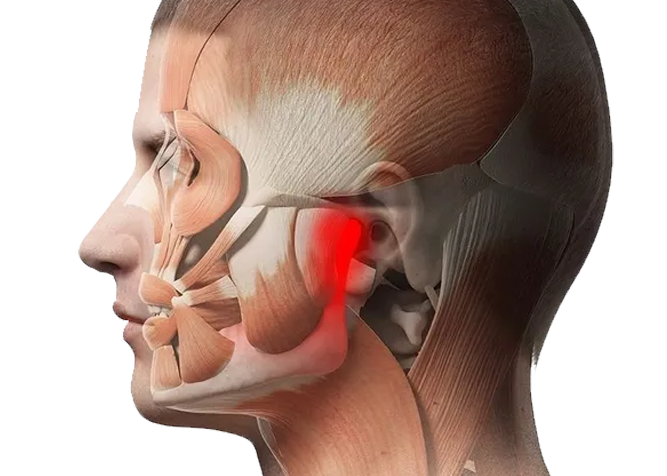
JAW disorder (Pain, Clicks) occurs when the muscles and ligaments around the Temporomandibular Joint (TMJ) or bones forming the joint become inflamed or irritated. The condition may be acute or chronic, and the resulting pain may be mild or severe. This pain might be associated with clicking sound from the joint while opening mouth or chewing.
Temporo- mandibular joint (TMJ) is located on both sides of face, just in front of the ears and connects our lower jaw (the mandible) to the skull bone(temporal bone). TM Joint- slides as well as rotates and assist in movements like chewing and speaking.
Temporo-mandibular joint (TMJ) is unique as joint on both the sides of facefunctions as one unit. Since TMJ is connected to the mandible, the right and left joints must function together and therefore are not independent of each other. It hasgliding function (side to side) and hinging(front and back) function. During all the movements of the jaw, only the lower jaw moves.
Normal full jaw opening is around 4-5 cm as measured from the edge of lower front teeth to edge of upper front teeth. The movements occur mainly by the four muscles : the masseter, medial pterygoid, lateral pterygoid and the temporalis. These four muscles move the mandible in different directions.
The joint space between the two bones is separated by an articular disc, which divides the joint into two distinct compartments. The inferior compartment allows for rotation of the head of lower jaw corresponding to the first 2 cm of the opening of the mouth. After the mouth is open to this extent, the mouth can no longer open without the superior compartment of the temporomandibular joints becoming active. The mandibular condyle head and the articular disc translates along with the inferior compartment to slide forward and downwards to fully open the mouth.
Symptoms of Jaw Disorder (pain, clicks)
Jaw disorders are most common in 20 to 40 years of age and is more common in women than in men and is associated with
- Jaw pain, facial pain, unexplained headaches and neck pain
- Tinnitus (ringing in ear), ear pain and heaviness.
- Sound of clicking while opening or closing mouth or during chewing
- Difficulty in chewing food
- Changes the way upper and lower teeth fit together.
- Swelling on the side of face.
- Tooth pain.
- Untreated cases may lead to Jaws that "lock" in the open- or closed-mouth position
Neglected cases may lead to long-term problems such as sleep apnoea, sleeplessness, depression and anxiety in patients which can cause and trigger TMJ pain again as a vicious cycle.
Causes of Jaw Disorders (Pain, Clicks)
It is difficult to pinpoint the causes leading to this TMJ disorders. But probable causes include-
- A misaligned or uneven bite (malocclusion)
- Jaw injuries,
- Arthritis,
- Joint erosion,
- Teeth grinding or bruxism (habitual grinding of the teeth mostly in night) and habitual jaw clenching.
Diagnosis of Jaw disorder (Pain, Clicks)
You can examine yourself and see whether you have TMJ Disorder (pain, clicks)
- Listen to and feel your jaw when you open and close your mouth. Do u hear any sound of click.
- Observe the range of motion in your jaw by sliding the joint in all directions.
- Press on areas around your jaw to identify sites of pain or discomfort.
- Look for facial asymmetry while opening the mouth.
- Misalignment of the teeth.
- Does your jaw lock while yawning or opening the mouth widely
If you have one of these symptoms, then you might be having TMJ dysfunction. Once you visit us, we will examine you completely and would require the following investigations for diagnosis-
- Dental X-rays to See the status of your teeth and jaw
- CT scan to provide detailed images of the bones involved in the joint and to rule out arthritis
- MRI for detailed analysis of the joint space, joint disk or surrounding soft tissue. This is not done in TMJ dislocations
- TMJ arthroscopy is sometimes used in the diagnosis of a TMJ disorder. During TMJ arthroscopy, a small thin tube (cannula) Is insertedinto the joint space with a small camera (arthroscope) to view the area and to help determine a diagnosis.
Non-surgical treatment of Jaw disorder (Pain, Clicks)
TMJ Disorders can be treated either surgical or non-surgical depending on the conditions. All the disorders are initially treated with non-surgical and conservative treatment
- Painkillers like NSAIDs
- Muscle relaxants
- Application of moist heat and cold packs,
- Soft diet
- In few cases low dose antidepressants to release the patient of the anxiety and sleeplessness associated with the disorder.
- Mouth guard for night and splintsto be worn 24 hours a day.
- Ultrasound therapy to relieve soreness or improve joint movement.
- Pain medication or local anaesthesia can be injected into painful muscles of the face (called "trigger points") to relieve pain
- Avoid extreme jaw movements
- Be mindful of opening your mouth while yawning
- keep your chewing movement to a minimum.
- Improve your posture to reduce neck and facial pain.
- Keep your teeth slightly apart as often as you can to relieve pressure on the jaw.
- To control clenching or grinding during the day, place your tongue on the palate behind your upper front teeth.
- Learn relaxation techniques to help control muscle tension in the jaw.
Surgical treatment of Jaw disorders (Pain, clicks)
When non-surgical methods have failed to give relief in TMJ disorders, then surgical treatmentcan be opted for. The various modalities of treatment available are-
- Injection of steroid into the joint space-reduces the inflammation and pain associated with problems within the bone across the joint
- Arthrocentesis. This procedure is performed under local anaesthesia. It is done when steroid injection does not give any relief in pain or reduce the inflammation and the condition has progressed to even having difficulty while opening the mouth. Arthrocentesis is also done when the jaw suddenly locks in the closed position. It is done with the help of needle inserted into the TM joint and then irrigation is done with saline fluid to wash off the debris and the products of inflammation out of the joint
- Arthroscopy. This procedure is performed under general anaesthesia. A small incision is made in front of the year and Arthroscopy with the light is inserted in TMJ andwhole joint is inspected and washed under vision.Any piece of inflamed tissue or debris is removed. Because arthroscopic surgery is performed through tiny incisions, there is less scarring, a shorter recovery time, less discomfort, and fewer complications compared with open-joint surgery.
- Open-joint surgery. it is done under general anaesthesia and a longer incision is placed within the curvature of your ear which is very well hidden. Open joint surgery is indicated in
- If you hear clicking sound- MRI suggests internal derangement of the articular disc. In this, we need to repair or reposition the articular disc
- Any tumours in and around TM joint
- TM joint dislocations
- Severe arthritis of the bony structures involving the joint which leads to TM Joint replacement.
Open joint surgery has a longer healing time and a chance of injury to frontal branch of the facial nerve but still is the surgery of choice in patients with recurrent painful clicks and joint dislocations
Within 48 hrs of surgery, patient begins physical therapy to regain the proper jaw movements.
Self-care in preventing JAW disorder (Pain, Clicks)
- Use a mouth guard, helmet or other safety equipment to protect face during sport.
- Asking the patient to bite on a bite block and ensuring adequate rest during prolonged dental treatment
- Take treatment for TMJ Disorder (pain, click)
- Do not open your mouth too wide
- Do not avoid warning signs of Dislocation
Self-care in preventing Recurrent JAW disorder (Pain, Clicks)
- Eat soft foodsto chew less
- Avoid chewing gum, don’t clench your jaw tightly
- Do not open your mouth too wide.
- Wear a mouthguard at night to prevent from grinding teeth, and
- Relaxation exercises to minimise stress.
- Exercises to strengthen jaw can also help.
Treatment of JAW disorder (Pain, Clicks)
- Acute and sudden JAW disorder (Pain, Clicks) which ‘locks’is an emergency and is reduced with conservative approach.Joint will be manipulated back into its correct position either manually or in few cases by surgery. A local anaesthetic will be givenso as to not feel any pain, and medicines to relax muscles so the jaw can be moved back into place properly.
- Once the jaw is back in place, it will need to be kept stable with bandages that prevents from opening the mouth too wide.
- Care should be exerted for minimum 6 weeks to not open mouth wideafter reduction of jaw.
- Jaw should be supportedwith hand every time you sneeze or yawn during this time
- Recurrent JAW disorder (Pain, Clicks) can be prevented with
- Injection of autologous blood into the TM joint
- Wearing occlusal splints
- Treatment of Chronic Recurrent JAW disorder (Pain, Clicks)is with Open Joint Surgery-
- Removal of the condyle head
- Removal of the articular eminence
- Release of temporalis muscle
Open joint surgery has a longer healing time and a chance of injury to frontal branch of the facial nerve but still is the surgery of choice in patients with recurrent painful clicks and joint dislocations
Know your surgeon better
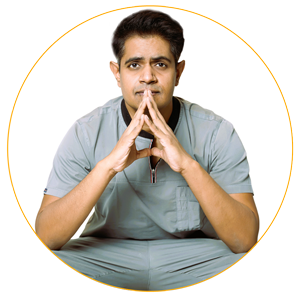
Best plastic surgeon, Dr. Amit Agarwal is an American Board Certified, extensively trained, and best Plastic & Aesthetic surgeon in Lucknow. He is the Chief Plastic Surgeon heading the Department of Plastic, Microvascular, and Craniofacial surgery at Vivekananda Polyclinic and Institute of Medical Sciences, Lucknow, U.P, India. He maintains a busy practice at Avadh and Nishat Hospital and his own center - Kayakriti Plastic Surgery & Dental Center. He was formerly a Consultant in the Department of Plastic Surgery and Burns at the prestigious SGPGI, Lucknow.
MS, DNB (General Surgery) MCh, DNB (Plastic Surgery),
MNAMS, FACS, FICS, FRCS (Edinburgh, UK)
His Credentials
Three pillars of kayakriti
Privacy
We believe your experience with us should be comfortable and hassle-free to make it one of your best lifetime experiences for yours. We, here at the clinic, take full precautions to maintain your privacy in any manner. We also provide a staff who will receive you from the gate and take you to the chamber directly if you demand.
Trust
Our Surgeon is highly qualified and internationally certified with a team of skilled staff to perform any surgical or non-surgical treatment on your body.
Safety
When you plan to undergo any surgery you should always keep in mind that it's your body and it's a surgery. We, here always keep your safety a priority and will never recommend you to undergo any such procedure which is not safe for you. We also provide you with a detailed description of the complications which may occur after the surgery during the consultation as it's a surgical procedure so there may be some complications depending on the way your body reacts.
Kayakriti in news



Frequently Asked Questions
If you have flat or small breast and you want to improve your breast and hip contour ratio then you are a good candidate for it. The answer will be best provided after the first consultation with Dr Amit Agarwal.
Acute pain will be there for almost a week which gradually reduces and there will be soreness and swelling which may take up to 3 weeks to subside.
You can join your work and daily routines after a week of the procedure and can start exercising after 3 weeks of it.
Yes, you have to wear it round the clock unless we suggest you to remove it.
This surgery does not affect the ducts or the areas of the breast involved in milk production. Thus, it does not affect the breast feeding.
This surgery does not affect the ducts or the areas of the breast involved in milk production. Thus, it does not affect the breast feeding.












Kayakriti Plastic Surgery & Dental Center
D-43, Near Punjab National Bank, Rajajipuram, Lucknow, Uttar Pradesh - 226017, India
Phone No. +919695940009, +919695940006
Map Location

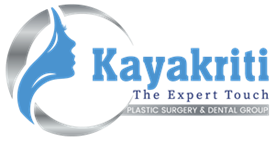


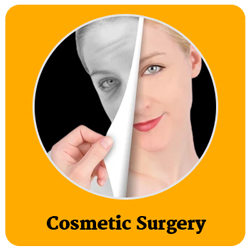
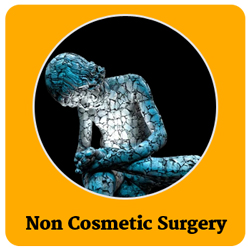























Social Media Presence